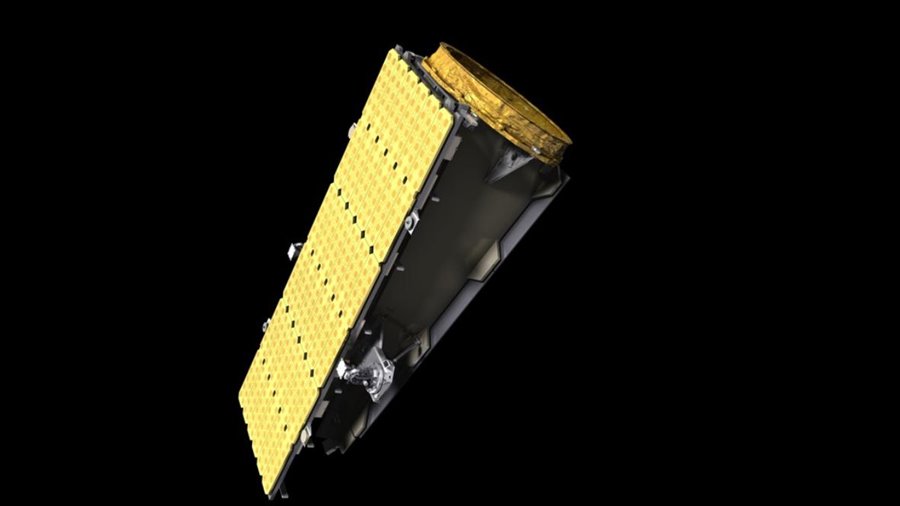
Rt. Honourable David Willetts, Minister of State for Universities and Science, today announced an investment of £21M that will enable British small satellite pioneer SSTL to launch an innovative and highly competitive new space-based radar remote sensing programme in the international market.
Synthetic Aperture Radar (SAR) is a powerful tool for monitoring the Earth from space because of its ability to see through clouds and image Earth night or day. Despite growing demand, the cost and complexity of radar satellites severely limit their use where it is urgently needed - such as maritime surveillance (anti-piracy, illegal fishing, drug trafficking, pollution), the oil & gas industry (pollution, ice hazards, arctic passages) and environmental & climate monitoring (deforestation, disaster monitoring, relief co-ordination)
Minister for Universities and Science David Willetts said “Satellites enable us to monitor and manage some of the most important issues affecting our planet. This exciting project will provide the UK with a world-leading constellation of its own and is a clear signal of the Government’s continued commitment to the UK space industry.
“NovaSAR will keep us at the forefront of space technology, and will drive growth and innovation as governments and businesses across the globe develop scientific and commercial uses for the data.”
Through an intensive development programme, the combined expertise of Surrey Satellite Technology Ltd (SSTL) on advanced small satellite platforms and Astrium UK experience on radar payloads has created a new small radar satellite (NovaSAR) that offers powerful radar remote sensing capabilities for approximately 20% of the cost of conventional radar missions. The Government will provide the necessary seed funding alongside industry to develop and build the first NovaSAR demonstration satellite, enabling the UK to showcase the highly attractive technology to the global marketplace and initiate a constellation of NovaSAR satellites similar to the highly successful Disaster Monitoring Constellation (DMC) of optical small satellites. The first NovaSAR demonstration satellite could be launched as early as 2013.
Sir Martin Sweeting, Executive Chairman SSTL commented, “This support by the Government is absolutely critical in bringing this world-beating technology to market. Experience with the Disaster Monitoring Constellation has shown that modest Government investment can catalyse an enormous multiplier for high value manufacturers such as SSTL, Astrium and the UK space industry to grow our exports and share in an international space market worth more than £178bn per year.”
Government will contribute £21 million to assist in the development and launch of the first satellite, which if the project progresses as planned will leverage an additional £154 million of inward investment to the UK. Once the NovaSAR constellation is up and running, it is anticipated that this small Government investment could yield a 50:1 return of £1bn over the coming decade, creating or maintaining more than 300 highly skilled jobs in the UK space industry and many hundreds more jobs to provide data analysis services downstream. This impressive return has already been demonstrated by the earlier MOSAIC programme investments that have enabled SSTL alone to develop from 80 employees to a highly successful space company of 450 and generated more than £500M in export orders.
In addition to securing export orders for satellites in the constellation, the partnership expects a significant return on investment from sales of data from the constellation by downstream applications and services anchored in the UK. The Government would also benefit from access to NovaSAR data – significantly boosting the UK’s sovereign Earth observation capabilities for applications such as monitoring drug trafficking, piracy or identifying illegal logging and deforestation. This represents an example of imaginative 'smart procurement' by government that will not only benefit HMG policy implementation but also facilitate significant export sales for the UK in the years ahead.
About SSTL
Surrey Satellite Technology Limited (SSTL) is the world's leading small satellite company, delivering operational space missions for a range of applications including Earth observation, science and communications. The Company designs, manufactures and operates high performance satellites and ground systems for a fraction of the price normally associated with space missions, with over 400 staff working on turnkey satellite platforms, space-proven satellite subsystems and optical instruments.
Since 1981 SSTL has built and launched 36 satellites – as well as providing training and development programmes, consultancy services, and mission studies for ESA, NASA, international governments and commercial customers, with its innovative approach that is changing the economics of space.
The Disaster Monitoring Constellation is an international constellation of optical Earth observation small satellites created and led by SSTL that provides commercial imaging and assists in monitoring natural and man-made disasters.
MOSAIC was a Government programme in 2002 that catalysed the use of microsatellites to provide high quality, rapid response optical imaging of disaster-stricken areas and commercial applications which has yielded £200M of direct UK export sales of small satellites for optical Earth observation - a remarkable return on HMG investment for the UK economy.
Based in Guildford, UK, SSTL is owned by EADS Astrium NV.
www.sstl.co.uk